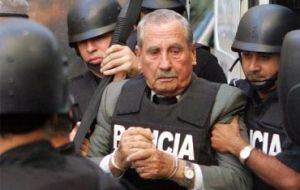MercoPress. South Atlantic News Agency
Supreme Court ratifies 25-year jail sentence for former dictator General Alvarez
 General Gregorio Alvarez, 85, will spend the rest of his days incarcerated
General Gregorio Alvarez, 85, will spend the rest of his days incarcerated Uruguay’s Supreme Court ratified Friday the 25 year jail sentence for former military dictator General Gregorio Alvarez and for former naval officer Juan Carlos Larcebau found guilty of in 37 and 29 homicide cases, respectively, committed during the military regime from 1973 to 1985.
The homicides included several cases of forced disappearances, transported to Argentina in 1978 in the framework of the Condor Plan which coordinated repression efforts of the Southern Cone military dictatorships of the time.
At the time Argentina, Brazil, Paraguay, Chile, Bolivia and Uruguay were under military rulers.
The ruling supports the position that the crimes committed by Alvarez and Larcebeau are not benefited by prescription given the “dangerous” condition of both culprits and because of the ontological graveness of the crimes perpetrated.
Likewise the high court ruling ratifies the description as “homicide very especially aggravated”, the crime committed by the Uruguayan dictatorship and threw out the crime of “forced disappearance” since such figure was not typified at the time they were committed.
Magistrate Luis Charles first sentenced Alvarez and Larcebeau who have been in prison since 2007, on 22 October 2009.
The crimes committed were excluded from the benefits of the so called “expiration bill” which gives the Uruguayan Executive and not the Judiciary, the discretion to decide whether human rights violations committed by military or police personnel can be sent to court.
The 1986 ‘expiration bill’ was ratified by plebiscites in 1989 and again in 2009. The bill matches the ‘amnesty bill’ which benefited the guerrillas and others who took to arms and other violent means to depose government in the sixties and early seventies when Uruguay was under rule of the law and democratic institutions.
The bill was among the first to be voted by the Uruguayan parliament in 1985 on the return of democracy to empty the jails of political prisoners.
Alvarez was nominated president by his peer generals in 1981 until 1985. He’s the only surviving dictator since Juan Maria Bordaberry, who was freely elected in 1971 and accompanied the military coup on June 1973, died last July.




Top Comments
Disclaimer & comment rulesCommenting for this story is now closed.
If you have a Facebook account, become a fan and comment on our Facebook Page!